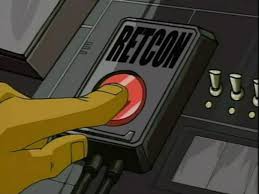The Truth About Retcons
By Anthony Casperson
10-26-19
Retcons, or retroactive continuities, are staples of modern stories. In some cases, it happens because a mistake was made that had to be explained away for the sake of consistency. Other times, a retcon happens because a new author, who doesn’t like the direction of previous writers, decides a new direction needs to happen. And then there’s always community backlash that causes the author to change the details because of the external pressure.
The concept of imperfect storytellers trying to convey a tale that remains internally consistent, and then failing, is not new to us. We see it when comic book characters are declared not to have died in that catastrophic event. Dates are changed because the story’s chronology wasn’t set when the author began the tale. Important psychological details are forgotten because they don’t aid the current narrative.
Retconning has become so common that we tend to see truth as more flexible than it is. But what happens when we bring this attitude of retcon to things such as God’s word? Does retconning happen then?
For some, the answer might seem obvious. “Of course,” these will say, “there’s retconning. Isn’t that why there’s an Old Testament and a New Testament?”
Well…no.
God set down his plan of salvation, his salvific narrative, before the world began. When he set about to create the universe and everything in it, he knew that humanity would fall. He chose to extend love to those who accept it. He called us to be holy as he is holy. The truth of his ways were etched into his very creation.
God knew that a man named Abraham would come, and he’d offer a promise to this man merely because of the grace of God. All nations, all humans, would have the ability to be blessed through the chosen seed of this man.
There was going to come a time when the descendants of Abraham would require something to show them what holiness means to God. What the truth is. Paul speaks of this law as a tutor in Galatians 3:24-25. Though that particular word “tutor” doesn’t do justice to Paul’s meaning.
This word for tutor was used in the Greco-Roman world of a slave who supervised children of a “higher” class. The child couldn’t even leave the house without this stern guardian at their side. Ethics and morality were the primary lessons taught by this tutor, not grammar and arithmetic. This ever-present tutor could even be stricter than the father of the child. (Think about that in regard to God the Father and the Mosaic Law.)
God also knew the time would come when he would send his Son, the Word, the Second Person of the Trinity into the world, enfleshed in humanity, to live a perfect and holy life so that he could sacrifice himself for fallen humanity. The sinless for sinners. The just for the unjust. The holy for the unholy.
This sacrifice, this literal crux of God’s plan for saving the world, wasn’t an afterthought. It wasn’t a retcon placed after God realized that he needed to do something drastic. And it certainly wasn’t a new author of creation stepping onto the scene. This whole plan was set before a single second ticked within creation.
From the very first call of light to this very day, and beyond into eternity, God planned his story, with his truth bearing full authority throughout. He didn’t have to retcon because this was always supposed to be the way. And he doesn’t have to retcon previous events sometime in the future for any reason.
In Galatians 3:15, Paul writes out a human understanding as principle for us. Once a covenant (a binding contract) is made, no one can annul or add to it. His point, specifically, is how the Law was meant to be taken in light of God’s promise to Abraham. And both of these pointed to the cross.
It didn’t matter that the culture of the Jewish nation taught them that the Law was supposed to outshine everything. The moral and ethical teachings of the Law are important to remember, but there is a maturity greater than it found in the cross.
The Abrahamic covenant was the infant stage of God’s plan of salvation. The Mosaic Law was the adolescent stage. And the covenant brought about because of the cross is the adult/mature stage. The plan that had been set from the beginning had reached maturity. It reached its perfect end without need of a retcon.
Though, I think there’s something universal that we can learn from this specific teaching of Paul to the Galatians of the first century. If God set his truth, the Truth, from the beginning of creation, and if he called us to the same truth in every age, then there should be no retconning when it comes to what is true.
The teachings of the bible remain true regardless of what culture finds its place in the majority. It is true regardless of what year it is. It is true regardless of which particular second of existence that is taken into account. The universality of the Truth requires no retcon.
When we seek to change the definition of God’s Truth for any reason, we malign the name and power of God. If we have to change the universal teaching of God to better fit our fallible, human understanding, then we end up questioning his all-knowing nature. Or worse yet, we place another author on his throne.
When we deny the clear teachings of God’s word, we are calling into question the very deity of God. To retcon the Truth of God is to deny his power as all-knowing author.




